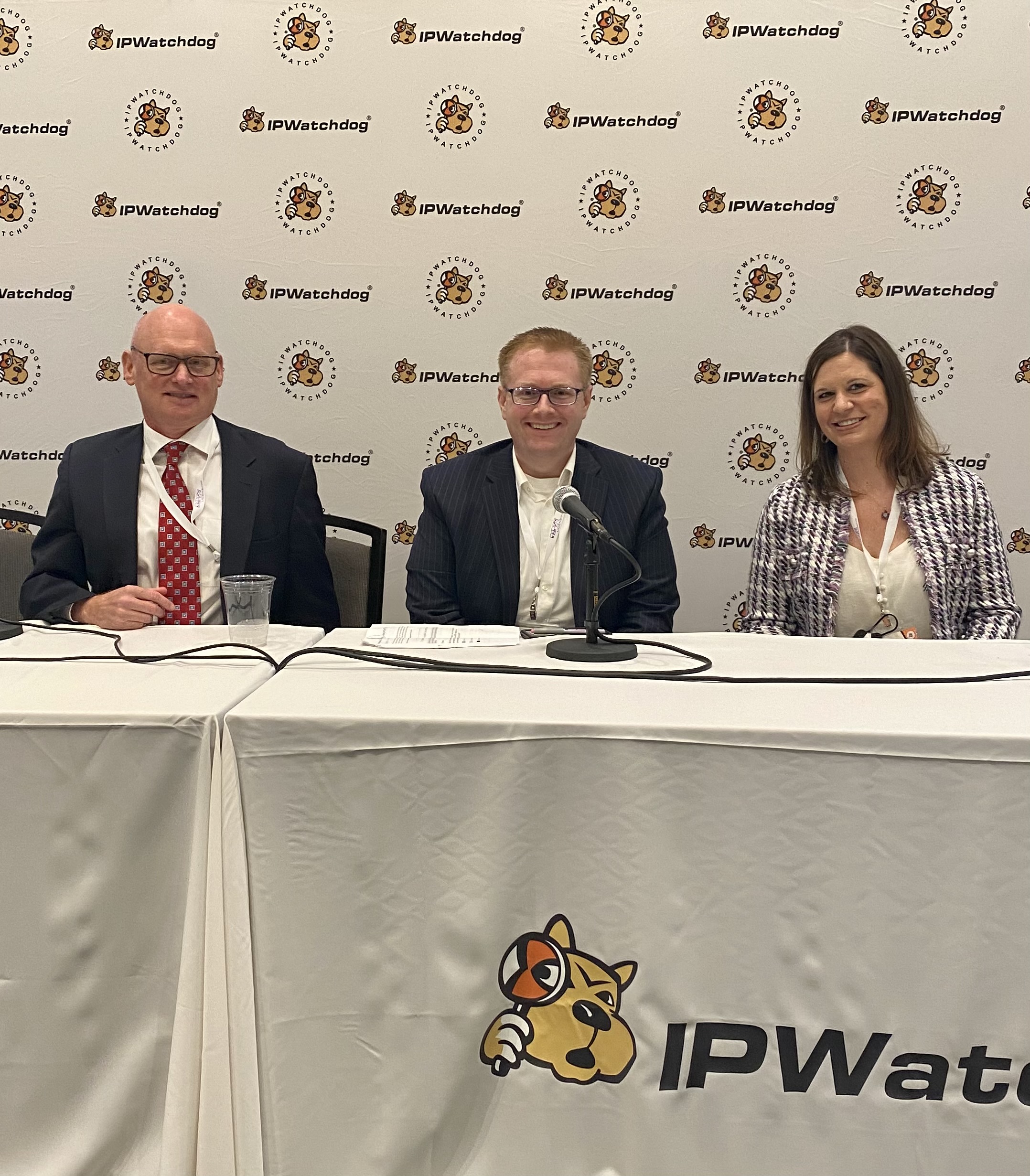“The [PTAB] is not impressed by flash. They want someone who can engage with them on the technical arguments.” – Sarah Spires

From left: James Carmichael, Nicholas Matich and Sarah Spires.
On the second day of IPWatchdog Live in Dallas, Texas, a panel of attorneys shed light on how to triumph at the Patent Trial and Appeal Board (PTAB). The differences between PTAB and district court proceedings are many. Unlike the majority of district court judges, the Administrative Patent Judges (APJs) consist of technically savvy engineers and scientists. Additionally, there are evidentiary standard and procedural differences for inter partes reviews (IPRs) at the PTAB. The distinctions between the two parallel forums creates strategic differences that practitioners must consider if they hope to succeed.
In district court, successful attorneys often create a narrative which paints their client as the “good guy” and the opposition as villainous. While this strategy of painting a picture that can connect with judges and juries on an emotional level is often successful in district court, the panelists cautioned against this approach at the PTAB. One of the panelists noted that, due to the fact that the APJs possess technical backgrounds, these emotional appeals are likely to fall on deaf ears and may prove counterproductive. Instead, more technical conversations will be persuasive in this forum. Panelist Sarah Spires of Skiermont Derby said, “[t]he [PTAB] is not impressed by flash. They want someone who can engage with them on the technical arguments.” In fact, many APJs are likely to find these appeals to emotion insulting to their intelligence and technical prowess.
Another common misstep that is seen frequently is the poor utilization of expert declarations. Unlike briefs, which are subject to more stringent page limits, expert declarations provide room for PTAB litigants to dive deeply into the heart of the technologies at issue. However, as often happens, expert declarations appear to be “carbon copies” of briefs. This is a giant missed opportunity that often results in expert declarations being deemed as merely conclusory by APJs.
Many representatives presenting before the PTAB make the mistake of arguing that their client’s patented invention works better than the prior art. Though the panelists conceded that this is not as poor of a choice for the more unpredictable biotech field, in the more predictable arts, this can be a patent killer. In the more predictable arts, this argument serves to plant the seed in the mind of the APJs that the invention, though possibly better than the prior art, is also obvious.
The IPR proceeding provides patent owners with an option to motion to amend claims that are at issue in order to save the validity of the patent. However, this is an option that the panelists unanimously cautioned against. A major concern of amending claims during an IPR is the bar this will create on obtaining past damages. If the patent owner hopes to collect for an infringer’s prior conduct, amending the claims will remove all hopes of this. Additionally, patentees are typically hesitant to opt to amend due to the fact that this creates a perception that the inventor made a tacit admission of invalidity.
Noting the relatively new Phillips claim construction standard, both the panelists and attendees cheered many of the changes to the PTAB implemented by former United States Patent and Trademark Office (USPTO) Director Andrei Iancu. The panelists noted that, like many things in the country, the USPTO has become more politicized in recent years. However, this was not seen as negative per se. One response to the increased politicization has been the formation of advocacy groups as a voice for further reforms that may serve as a catalyst to impact the implementation of even better procedures going forward.
In addition to Spires, the panel featured former APJ James Carmichael of Carmichael IP and Nicholas Matich of McKool Smith.

![[IPWatchdog Logo]](https://ipwatchdog.com/wp-content/themes/IPWatchdog%20-%202023/assets/images/temp/logo-small@2x.png)

![[Advertisement]](https://ipwatchdog.com/wp-content/uploads/2024/04/Artificial-Intelligence-2024-REPLAY-sidebar-700x500-corrected.jpg)
![[Advertisement]](https://ipwatchdog.com/wp-content/uploads/2024/04/Patent-Litigation-Masters-2024-sidebar-700x500-1.jpg)

![[Advertisement]](https://ipwatchdog.com/wp-content/uploads/2021/12/WEBINAR-336-x-280-px.png)
![[Advertisement]](https://ipwatchdog.com/wp-content/uploads/2021/12/2021-Patent-Practice-on-Demand-recorded-Feb-2021-336-x-280.jpg)
![[Advertisement]](https://ipwatchdog.com/wp-content/uploads/2021/12/Ad-4-The-Invent-Patent-System™.png)






Join the Discussion
9 comments so far.
Alan
September 25, 2021 08:56 pmCan’t agree with PTAB APJs being tech savvy. My personal experience is they are technically incompetent. Way less knowledgeable in the art than the SPEs in the art units I have dealt with. I have read many more recent FWDs where the APJs challenged the petitioners, but early on the PTAB was a disaster.
Pro Say
September 16, 2021 10:36 pmPTO — I: America Invalidates Act.
Excellent. The new, accurate moniker for this innovation-killer.
PTO-indentured
September 16, 2021 11:09 amPTAB — Means for: US Patent System’s ‘We Giveth, and We Taketh Away’ conveniently, all under the same roof.
(Mind-bogglingly) Because patents we issue are so poor we
haveget to invalidate them 84% of the time! But, not until we have taken in all patentee fees due along the way.Then, We Giveth Away our US IP for free to China and make it so weak multinational Big-Tech firms (of oligarch scale) bask in the on-going spoils of our poster child ‘efficient infringement’.
Well done! The America Invalidates Act — bringing you patents an order of magnitude weaker than pre-AIA — back when the US patent system and our country’s innovation had been thriving for decades.
Concerned
September 16, 2021 09:59 amMax D:
Nothing surprises me. The USPTO and PTAB both admitted in writing that my process solved a problem that existed from day one of the program and met the law as passed by Congress. And many people who tried to solve this problem have law degrees just like the PTAB.
Why would anything the PTAB does surprise you?
concerned
September 16, 2021 05:49 amI agree with Mr. Malone. The PTAB wrote in my appeal whatever nonsense supported their view, regardless how contrary to the official record. I’m not sure the PTAB even read the official record based on their decision.
I was watching Judge Judy. A defendant was trying to convince Judge Judy to disregard medical records and an official report of aminal control regarding a dog bite. Instead the defendant wanted Judge Judy to listen to the non-supported testimony of their friend, who did not witness the incident.
Judge Judy stated she has been a judge over 40 years and documentation mattered.
The PTAB did state my process met the law as passed by Congress and still wrote their nonsense.
May I transfer my patent appeal to Judge Judy where facts and documentation matter? I suspect the law as passed by Congress would also be near and dear to Judge Judy’s heart.
The PTAB appeals should be on live television like Judge Judy, where millions on common folks can witness the proceedings in the open. A common person does not need a law degree to know instinctively right from wrong.
Max Drei
September 16, 2021 03:14 amLooking in from Europe, where nothing is patentable that doesn’t solve a problem in technology, that is to say, deliver a technical effect, I was alarmed to read that before the PTAB it is a mistake to argue that the claimed subject matter works better than the prior art. It seems that to argue thus runs the risk of giving the judges the idea that what is claimed is obvious. Really?
If so, then when I draft a patent application for the USA should I refrain from including any statements about how the claimed invention works and what technical effects it delivers? Will including what is indispensible in the rest of the world prejudice my chances of a patent in the USA? If so, then drafting for world-wide success is no easy matter, is it?
Pro Say
September 15, 2021 07:28 pmYo Bro!
We be the Death Squad.
Death Squads don’t need no tech backgrounds!
No way! No how!
Josh Malone
September 15, 2021 04:46 pmIf you say “technical backgrounds” three times does it become true? Because the average APJ actually has ZERO technical background.
https://usinventor.org/ptab-judge-experience/
They are, however, very good at writing nonsense to support a conclusion of “we are persuaded by petitioner’s expert that it would have been obvious to a person of ordinary skill to combine X and Y in light of Z.